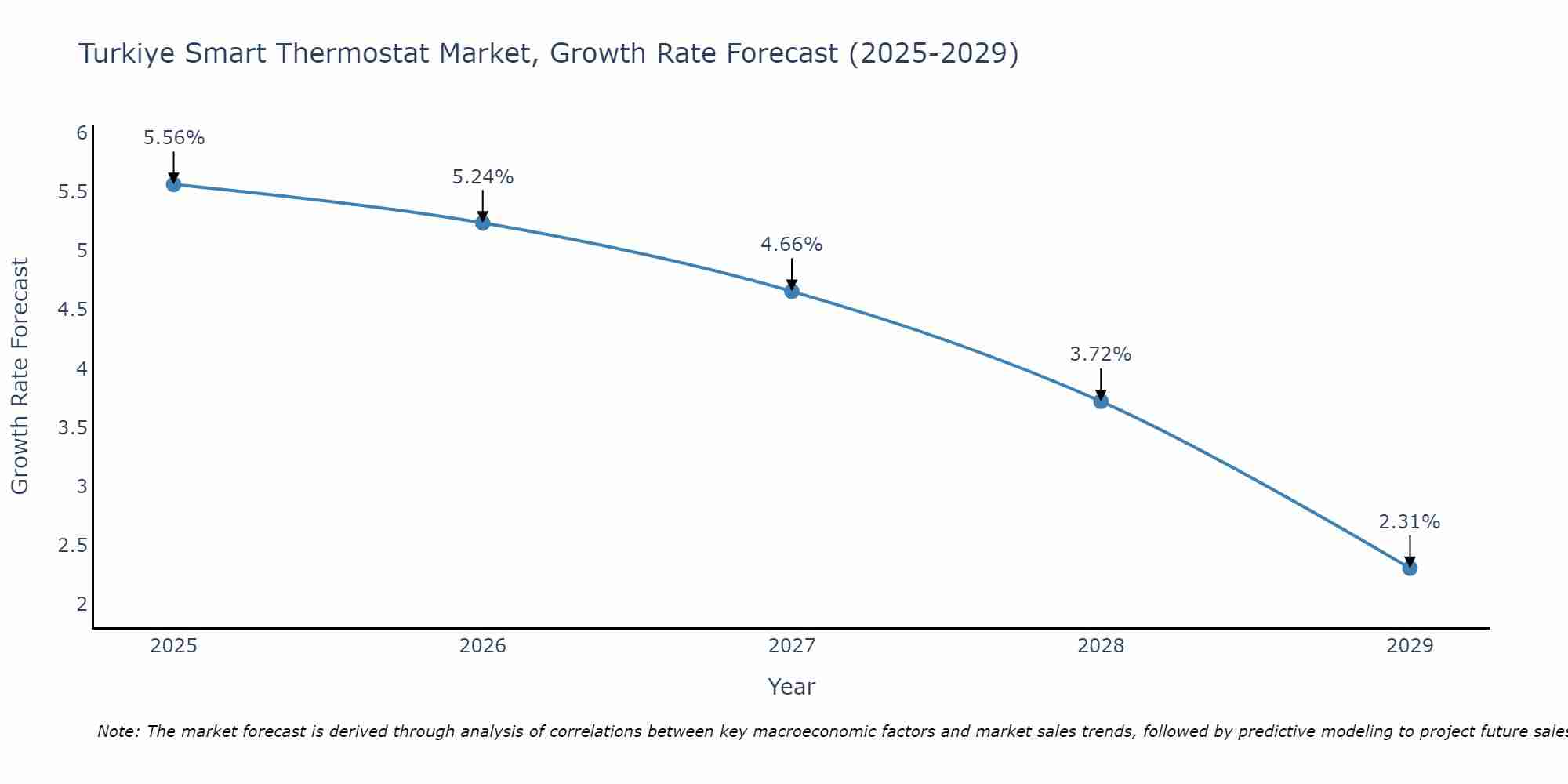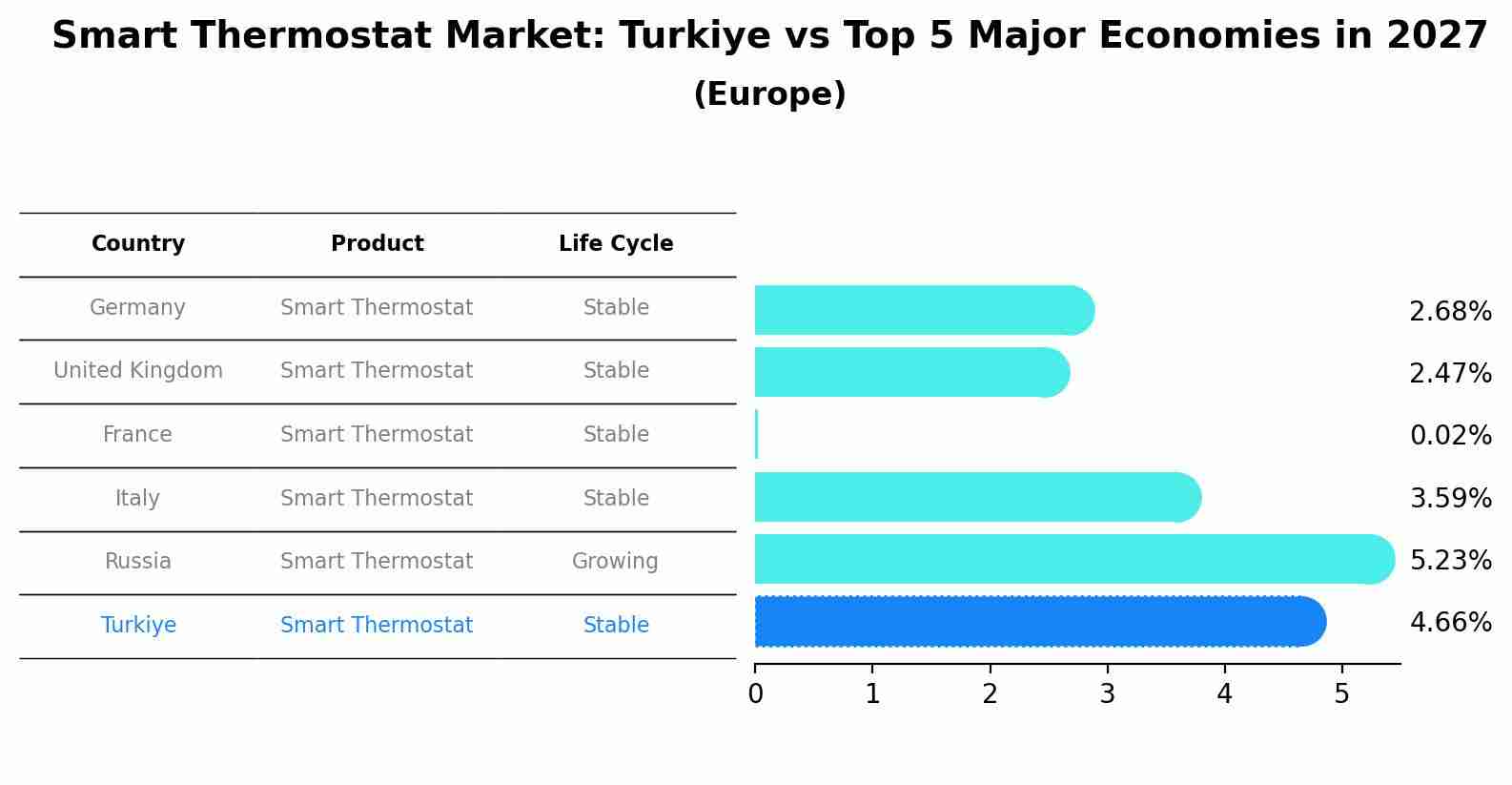Turkey Smart Thermostat Market Outlook | Size, Analysis, Industry, Forecast, Share, COVID-19 IMPACT, Trends, Growth, Companies, Value & Revenue
| Product Code: ETC369518 | Publication Date: Aug 2022 | Updated Date: Jul 2025 | Product Type: Market Research Report | |
| Publisher: 6Wresearch | Author: Dhaval Chaurasia | No. of Pages: 75 | No. of Figures: 35 | No. of Tables: 20 |
Turkiye Smart Thermostat Market Size Growth Rate
The Turkiye Smart Thermostat Market could see a tapering of growth rates over 2025 to 2029. Although the growth rate starts strong at 5.56% in 2025, it steadily loses momentum, ending at 2.31% by 2029.

Smart Thermostat Market: Turkiye vs Top 5 Major Economies in 2027 (Europe)
The Smart Thermostat market in Turkiye is projected to grow at a stable growth rate of 4.66% by 2027, within the Europe region led by Germany, along with other countries like United Kingdom, France, Italy and Russia, collectively shaping a dynamic and evolving market environment driven by innovation and increasing adoption of emerging technologies.

Turkey Smart Thermostat Market Synopsis
The Turkey Smart Thermostat Market is witnessing significant growth driven by factors such as increasing adoption of smart home technology, rising awareness about energy efficiency, and government initiatives promoting sustainable living. Smart thermostats offer benefits such as remote access, energy savings, and customization options, attracting consumers looking to optimize their home`s heating and cooling systems. Key players in the market are focusing on product innovation, integration with smart home ecosystems, and strategic partnerships to expand their market presence. The market is expected to continue its growth trajectory due to the growing trend of smart home automation and the increasing emphasis on environmental sustainability in Turkey. Additionally, the ongoing digitalization and urbanization trends in the country are expected to further boost the demand for smart thermostats.
Turkey Smart Thermostat Market Trends
The Turkey Smart Thermostat Market is experiencing significant growth due to the increasing adoption of smart home technologies and the growing awareness of energy efficiency. Consumers are increasingly looking for ways to control their home heating and cooling systems remotely, leading to a surge in demand for smart thermostats. Energy-saving features, such as learning algorithms and integration with smart assistants, are driving market growth. Additionally, government initiatives promoting energy efficiency and sustainability are further fueling the market. Integration with smart home ecosystems and advancements in artificial intelligence are expected to be key trends shaping the Turkey Smart Thermostat Market in the coming years.
Turkey Smart Thermostat Market Challenges
In the Turkey Smart Thermostat Market, one of the main challenges faced is the relatively low awareness and adoption rate of smart home technologies among consumers. Many Turkish households are still unfamiliar with the benefits and functionality of smart thermostats, leading to slower market penetration. Additionally, concerns over data privacy and security issues associated with connected devices are also hindering the widespread adoption of smart thermostats. Furthermore, the availability of reliable internet connectivity in all regions of Turkey remains a challenge, impacting the seamless operation of smart thermostats. To overcome these challenges, companies operating in the Turkey Smart Thermostat Market need to invest in educational campaigns to raise awareness, address privacy concerns through robust security measures, and collaborate with telecommunication providers to improve internet infrastructure across the country.
Turkey Smart Thermostat Market Investment Opportunities
The Turkey Smart Thermostat Market presents promising investment opportunities due to the increasing adoption of smart home technologies, rising energy costs, and government initiatives promoting energy efficiency. With a growing awareness of environmental sustainability and the benefits of smart home automation, there is a demand for energy-efficient solutions like smart thermostats. Investors can capitalize on this trend by investing in companies that manufacture or distribute smart thermostats, as well as those offering related services such as installation and maintenance. Additionally, partnerships with utility companies for incentive programs and collaborations with smart home technology providers can further enhance market presence and growth potential in the Turkey Smart Thermostat Market.
Jordan Agar Market Government Policies
The Turkish government has introduced various policies aimed at promoting energy efficiency and sustainability in the country`s Smart Thermostat Market. These policies include incentives and subsidies to encourage the adoption of smart thermostat technologies in residential and commercial buildings. Additionally, there are regulations in place that mandate the use of energy-efficient heating and cooling systems, driving the demand for smart thermostats. The government has also been actively involved in raising awareness about the benefits of smart thermostats through public campaigns and educational programs. Overall, the government`s policies are focused on reducing energy consumption, promoting environmental sustainability, and enhancing the overall efficiency of the Turkish heating and cooling sector through the widespread adoption of smart thermostat technologies.
Turkey Smart Thermostat Market Future Outlook
The future outlook for the Turkey Smart Thermostat Market appears promising, driven by factors such as the increasing adoption of smart home technologies, rising awareness of energy efficiency, and government initiatives promoting sustainable living. The market is expected to witness steady growth as consumers seek more convenient and cost-effective ways to manage their home heating and cooling systems. Furthermore, advancements in AI technology, IoT integration, and the growing trend of smart cities are likely to fuel the demand for smart thermostats in Turkey. Manufacturers are also focusing on developing innovative features and user-friendly interfaces to cater to the evolving preferences of tech-savvy consumers. Overall, the Turkey Smart Thermostat Market is projected to experience significant growth in the coming years.
Key Highlights of the Report:
- Turkey Smart Thermostat Market Outlook
- Market Size of Turkey Smart Thermostat Market, 2021
- Forecast of Turkey Smart Thermostat Market, 2031
- Historical Data and Forecast of Turkey Smart Thermostat Revenues & Volume for the Period 2018 - 2031
- Turkey Smart Thermostat Market Trend Evolution
- Turkey Smart Thermostat Market Drivers and Challenges
- Turkey Smart Thermostat Price Trends
- Turkey Smart Thermostat Porter's Five Forces
- Turkey Smart Thermostat Industry Life Cycle
- Historical Data and Forecast of Turkey Smart Thermostat Market Revenues & Volume By Type for the Period 2018 - 2031
- Historical Data and Forecast of Turkey Smart Thermostat Market Revenues & Volume By Wireless for the Period 2018 - 2031
- Historical Data and Forecast of Turkey Smart Thermostat Market Revenues & Volume By Wireless for the Period 2018 - 2031
- Historical Data and Forecast of Turkey Smart Thermostat Market Revenues & Volume By End-User Vertical for the Period 2018 - 2031
- Historical Data and Forecast of Turkey Smart Thermostat Market Revenues & Volume By Residential for the Period 2018 - 2031
- Historical Data and Forecast of Turkey Smart Thermostat Market Revenues & Volume By Commercial for the Period 2018 - 2031
- Turkey Smart Thermostat Import Export Trade Statistics
- Market Opportunity Assessment By Type
- Market Opportunity Assessment By End-User Vertical
- Turkey Smart Thermostat Top Companies Market Share
- Turkey Smart Thermostat Competitive Benchmarking By Technical and Operational Parameters
- Turkey Smart Thermostat Company Profiles
- Turkey Smart Thermostat Key Strategic Recommendations
Frequently Asked Questions About the Market Study (FAQs):
- Single User License$ 1,995
- Department License$ 2,400
- Site License$ 3,120
- Global License$ 3,795
Search
Thought Leadership and Analyst Meet
Our Clients
Related Reports
- Canada Oil and Gas Market (2026-2032) | Share, Segmentation, Value, Industry, Trends, Forecast, Analysis, Size & Revenue, Growth, Competitive Landscape, Outlook, Companies
- Germany Breakfast Food Market (2026-2032) | Industry, Share, Growth, Size, Companies, Value, Analysis, Revenue, Trends, Forecast & Outlook
- Australia Briquette Market (2025-2031) | Growth, Size, Revenue, Forecast, Analysis, Trends, Value, Share, Industry & Companies
- Vietnam System Integrator Market (2025-2031) | Size, Companies, Analysis, Industry, Value, Forecast, Growth, Trends, Revenue & Share
- ASEAN and Thailand Brain Health Supplements Market (2025-2031) | Strategy, Consumer Insights, Analysis, Investment Trends, Opportunities, Growth, Size, Share, Industry, Revenue, Segments, Value, Segmentation, Supply, Forecast, Restraints, Outlook, Competition, Drivers, Trends, Demand, Pricing Analysis, Competitive, Strategic Insights, Companies, Challenges
- ASEAN Bearings Market (2025-2031) | Strategy, Consumer Insights, Analysis, Investment Trends, Opportunities, Growth, Size, Share, Industry, Revenue, Segments, Value, Segmentation, Supply, Forecast, Restraints, Outlook, Competition, Drivers, Trends, Demand, Pricing Analysis, Competitive, Strategic Insights, Companies, Challenges
- Europe Flooring Market (2025-2031) | Outlook, Share, Industry, Trends, Forecast, Companies, Revenue, Size, Analysis, Growth & Value
- Saudi Arabia Manlift Market (2025-2031) | Outlook, Size, Growth, Trends, Companies, Industry, Revenue, Value, Share, Forecast & Analysis
- Uganda Excavator, Crane, and Wheel Loaders Market (2025-2031) | Strategy, Consumer Insights, Analysis, Investment Trends, Opportunities, Growth, Size, Share, Industry, Revenue, Segments, Value, Segmentation, Supply, Forecast, Restraints, Outlook, Competition, Drivers, Trends, Demand, Pricing Analysis, Competitive, Strategic Insights, Companies, Challenges
- Rwanda Excavator, Crane, and Wheel Loaders Market (2025-2031) | Strategy, Consumer Insights, Analysis, Investment Trends, Opportunities, Growth, Size, Share, Industry, Revenue, Segments, Value, Segmentation, Supply, Forecast, Restraints, Outlook, Competition, Drivers, Trends, Demand, Pricing Analysis, Competitive, Strategic Insights, Companies, Challenges
Industry Events and Analyst Meet
Whitepaper
- Middle East & Africa Commercial Security Market Click here to view more.
- Middle East & Africa Fire Safety Systems & Equipment Market Click here to view more.
- GCC Drone Market Click here to view more.
- Middle East Lighting Fixture Market Click here to view more.
- GCC Physical & Perimeter Security Market Click here to view more.
6WResearch In News
- Doha a strategic location for EV manufacturing hub: IPA Qatar
- Demand for luxury TVs surging in the GCC, says Samsung
- Empowering Growth: The Thriving Journey of Bangladesh’s Cable Industry
- Demand for luxury TVs surging in the GCC, says Samsung
- Video call with a traditional healer? Once unthinkable, it’s now common in South Africa
- Intelligent Buildings To Smooth GCC’s Path To Net Zero


















